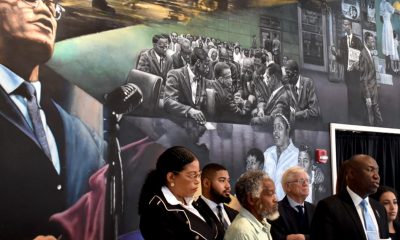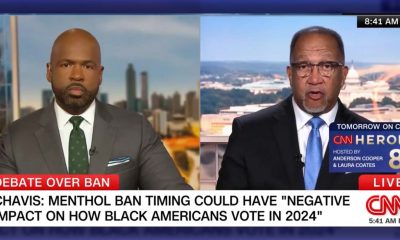Crime
Movement for Black Lives Notches Major Win in Chicago Race
By Kim Bellware, Huffington Post and other sources
Chicago’s States Attorney Anita Alvarez was ousted in the Democratic primary Tuesday night by challenger Kim Foxx (D), who now eyes a November bid for the role of top prosecutor of the nation’s second-largest county.
<p>
Foxx, 43, triumphed thanks to a wave of support and heavy organization from anti-discrimination and anti-police brutality groups in Chicago, many of which are affiliated with the Movement for Black Lives.
“The people have spoken and we’ve sent a clear message to Chicago’s elected officials,” said one activist after Alvarez’s defeat. “That those who are deaf to our cries and unsympathetic to our needs will be unseated due to a wave of mass mobilization come November.”
Foxx was among those who criticized Alvarez’s handling of the Laquan McDonald case — including the decision to wait more than 13 months to bring murder charges against the Chicago cop who was seen on camera shooting the teenaged McDonald.
In October 2014, Chicago police officer Jason Van Dyke allegedly shot the 17-year-old in the back 16 times. Neither Van Dyke nor any other officer on the scene was charged for the incident until a police video of the incident was made public last November, (over a year later) leading Chicago residents to criticize Mayor Rahm Emanuel and former Chicago police superintendent Garry F. McCarthy for the way they handled the case.
Cook County state’s attorney Anita Alvarez also came under fire for waiting 400 days before filing charges against Van Dyke, and on Tuesday, Cook County voters made their displeasure known by denying Alvarez a third term in office.
“The public has to hold feet to the fire on these issues. And Anita Alvarez’s feet have not been held to the fire,” Foxx said in an interview with the Chicago Reader.
The Chicago native’s history was also undeniably powerful: Raised in the now-demolished Cabrini-Green projects, Foxx fought through homelessness in high school to make it to college and then law school. She spent 12 years as a prosecutor in the Cook County States Attorney’s office, eventually working under Alvarez.
Foxx has said she was initially inspired by Alvarez, who held the role as Cook County’s top prosecutor since 2008, when she was the first woman and first Latina to score the Democratic nomination. But as those feelings gave way to disappointment, Foxx moved on to become chief of staff to Cook County Board President Toni Preckwinkle, considered the most powerful Chicagoan, according to Chicago Magazine — and a noted Alvarez foe.
Alvarez handily won her previous re-election bids, but her pattern of harsh prosecution of youth offenders — which made Cook County among the leaders for juvenile life without parole sentences — and low rate of prosecuting police misconduct eventually drew the ire of those hoping for progressive reform.
Alvarez lost by a landslide to Kim Foxx, a former chief of staff to Cook County board president Toni Preckwinkle. At the time the race was called — with 82 percent of precincts reporting — Foxx was up by more than 20 percent.
Her loss comes the day after the Daily Beast released a review that found Alvarez had “declined to file charges against Chicago police officers involved in the fatal shootings of at least 68 people in the last seven years,” although no documentation was available to explain why she decided not to file charges.
Although Alvarez had more experience than either of her opponents, her involvement in this and other controversial cases stripped her of the Democratic Party’s support — activists rallied against her on Twitter using the hashtag #ByeAnita.
Tom Balanoff, Illinois state council president of the Service Employees International Union (SEIU), said that Foxx’s victory was “a decisive vote for transparency and the reform of [the state’s] broken criminal justice system.” He went on, “We will continue our fight to eradicate the economic, social and racial inequality that currently plagues our state.”
California Black Media
Commentary: Finding the Right Balance — Addressing Organized Retail Theft While Upholding Civil Liberties
Organized retail theft is a significant issue that impacts both consumers and businesses. While it is crucial to address theft and protect businesses from losses, we should also be mindful of safeguarding individuals’ constitutional rights, particularly the right to due process. AB 1990 by Assemblymember Wendy Carrillo, also known as the STOP Act, raises concerns about the balance between addressing theft effectively and ensuring civil liberties are upheld.

By Assemblymember Tina McKinnor | Special to California Black Media Partners
Organized retail theft is a significant issue that impacts both consumers and businesses. While it is crucial to address theft and protect businesses from losses, we should also be mindful of safeguarding individuals’ constitutional rights, particularly the right to due process.
AB 1990 by Assemblymember Wendy Carrillo, also known as the STOP Act, raises concerns about the balance between addressing theft effectively and ensuring civil liberties are upheld. This bill allows law enforcement officers to make warrantless arrests for shoplifting offenses not witnessed by the officer, as long as there is reasonable cause to believe the individual committed the crime. This bill has a dangerous potential for overreach and infringes on civil liberties, particularly the right to due process.
While the stated intention behind the STOP Act is to combat organized retail theft and protect businesses, there are valid concerns that this bill is an overreach and that existing law works, if properly enforced by our partners in law enforcement. A petty theft involving property stolen valued at $950 or less may be charged as a felony or misdemeanor (called a wobbler) if the offender has the following prior convictions: 1) at least on prior petty or theft-related conviction for which a term of imprisonment was served, and 2) a prior conviction for a serious or violent offense, for any registerable sex offense, or for embezzlement from a dependent adult or anyone over the age of 65. A misdemeanor can result in a sentence of up to one year in jail, whereas a felon can mean incarceration for 16 months, two years or three years. Let’s look at shoplifting in California. It occurs when a suspect enters a store, while that establishment is open, intending to steal property worth less than $950. The crime is considered a misdemeanor, punishable by up to six months in the county jail.
Granting officers the authority to arrest individuals based on reasonable cause, without witnessing the crime firsthand, can lead to negative consequences and possible violations of individual rights. Probable cause is the legal standard by which police authorities have reason to obtain a warrant for the arrest of a suspected criminal and for the courts to issue a search warrant. A grand jury uses the probable cause standard to determine whether or not to issue a criminal indictment. The principle behind the probable cause standard is to limit the power of authorities to conduct unlawful search and seizure of a person or its property, and to promote formal, forensic procedures for gathering lawful evidence for the prosecution of the arrested criminal. Reasonable cause does not require any of this due process and only requires that an officer reasonably believes that a crime has been committed. It is essential to find a middle ground that effectively addresses organized retail theft without compromising the fundamental rights of individuals.
California’s current laws, including the use of witness statements and surveillance evidence are sufficient for addressing suspected shoplifting and organized retail theft. California Attorney General Rob Bonta recently prosecuted Michelle Mack, a suspected organized smash and grab ringleader who paid twelve women to travel around California and commit over $8 million in retail theft at 21 different stores. AG Bonta used California’s current laws to have the suspect arrested and brought to justice.
The State of California is also making significant investments to address retail theft. Just this past year California invested an additional $267 million to combat organized retail theft. It has been less than a year and our law enforcement partners should have the opportunity to address this recent spike in retail theft crime.
Los Angeles County recently applied for and received a grant for the State of California for $15.6 million dollars to address retail theft enforcement. LA District Attorney George Gascon also recently formed an organized retail task force that partners with LA County Sheriff’s Department, Glendale, Beverly Hills, Burbank, Torrance and Santa Monica Police Departments to integrate their response to retail theft across the region. These collaborative efforts, such as those seen in initiatives like the organized retail task force in LA County, demonstrate the importance of a united approach to tackling theft while maintaining a balance between enforcement and civil liberties.
As we move forward, it is essential for policymakers, law enforcement agencies, businesses and communities to work together in finding solutions that effectively address organized retail theft without encroaching on individual rights. Ongoing evaluation and a commitment to thoughtful consideration will be crucial in navigating this challenge and fostering a safe and prosperous environment for all. Balancing the scales of justice to protect businesses while upholding civil liberties demands a comprehensive and conscientious approach from all stakeholders involved.
I am confident we can find that balance.
About the Author
Assemblymember Tina McKinnor (D-Inglewood) represents the 61st District in Los Angeles County, which includes parts of the South Bay, Inglewood, Hawthorne and Lawndale.
Activism
Oakland Post: Week of April 10 – 16, 2024
The printed Weekly Edition of the Oakland Post: Week of April 10 – 16, 2024

To enlarge your view of this issue, use the slider, magnifying glass icon or full page icon in the lower right corner of the browser window. ![]()
Activism
Oakland Post: Week of April 3 – 6, 2024
The printed Weekly Edition of the Oakland Post: Week of April 3 – 6, 2024

To enlarge your view of this issue, use the slider, magnifying glass icon or full page icon in the lower right corner of the browser window. ![]()
-

 Activism4 weeks ago
Activism4 weeks agoOakland Post: Week of March 20 – 26, 2024
-

 #NNPA BlackPress3 weeks ago
#NNPA BlackPress3 weeks agoCOMMENTARY: D.C. Crime Bill Fails to Address Root Causes of Violence and Incarceration
-

 #NNPA BlackPress3 weeks ago
#NNPA BlackPress3 weeks agoMayor, City Council President React to May 31 Closing of Birmingham-Southern College
-

 #NNPA BlackPress3 weeks ago
#NNPA BlackPress3 weeks agoFrom Raids to Revelations: The Dark Turn in Sean ‘Diddy’ Combs’ Saga
-

 #NNPA BlackPress3 weeks ago
#NNPA BlackPress3 weeks agoCOMMENTARY: Lady Day and The Lights!
-

 #NNPA BlackPress3 weeks ago
#NNPA BlackPress3 weeks agoBaltimore Key Bridge Catastrophe: A City’s Heartbreak and a Nation’s Alarm
-

 #NNPA BlackPress3 weeks ago
#NNPA BlackPress3 weeks agoBaltimore’s Key Bridge Struck by Ship, Collapses into Water
-

 Activism3 weeks ago
Activism3 weeks agoOakland Post: Week of March 27 – April 2, 2024



















































